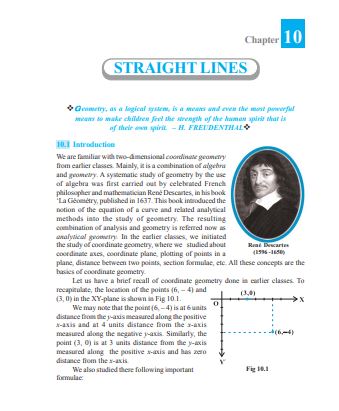‘NCERT Solutions for Class 11 Maths Chapter 10‘ PDF Quick download link is given at the bottom of this article. You can see the PDF demo, size of the PDF, page numbers, and direct download Free PDF of ‘Ncert Class 11 Maths Chapter 10 Exercise Solution’ using the download button.
NCERT Class 11 Maths Textbook Chapter 10 With Answer Book PDF Free Download

| Author | NCERT |
| Language | English |
| No. of Pages | 33 |
| PDF Size | 393 KB |
| Category | Mathematics |
| Source/Credits | ncert.nic.in |
NCERT Solutions Class 11 Maths Chapter 10 Straight lines
NCERT Class 11 Maths Textbook Chapter 10 With Answer Book PDF Free Download
